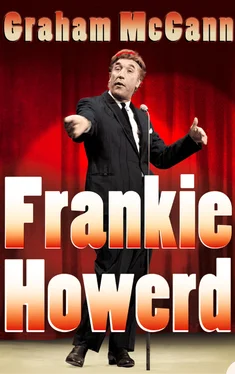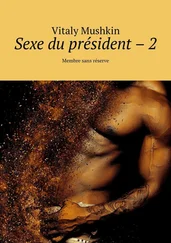While all of this comic bonding was going on, it appears that Howerd was also forming a far less predictable romantic attachment to the female third of the tourâs troupe of youngsters: Pam Denton. How real (and how intimate) this relationship actually was remains unclear â he would make no mention of it in his memoirs, and she would subsequently disappear without a trace from public life â but, according to Max Bygraves, Denton was one woman with whom Howerd became âtotally enamouredâ. 36
He certainly liked her, and liked spending time with her, and she, in turn, appears to have enjoyed being with him. He had always been fascinated by speciality acts (he would be joined on a subsequent tour by strongwoman Joan âThe Mighty Mannequinâ Rhodes), and had been drawn right from the start of the tour to Dentonâs carefully choreographed on-stage contortions. He also warmed to her calm, down-to-earth and friendly personality â and, like any other comedian, he loved the fact that she laughed so long and so loudly at so many of his jokes.
Tall and thin with an engagingly open face and a bright, gap-toothed grin, he had, in those days, a far from unpleasant physical presence, and, when his spirits were high, he was quite capable of exuding a considerable amount of charm. His problem, however, was that while it took something extraordinary to lift his spirits up, it only took something trivial to drag them down to the floor. As Bill Lyon-Shaw recalled:
Poor Frank was very shy, very introverted, and terrified of everybody â especially women. I think the main reason for this was that heâd been turned down by a lot of the girls of the ATS â letâs face it, he was no oil painting! â and I gather that theyâd been rather cruel to him. So that was the thing that had made him so frightened of women. 37
Denton, however, was different. She admired his talent, and was touched by his vulnerability; whether she wanted ultimately to make love to him or merely to mother him, she certainly wanted to share many of her spare hours with him. He was gentle, attentive and very, very funny, and, in her eyes, he made even the toughest times of the tour seem tolerable.
He dubbed it âOur Tour of the Empire â The Empire Sheffield, Wigan, Huddersfield, Glasgow â¦â 38 When things had gone well for both of them, he would relax, sit back, and entertain her with a selection of dialogue and one-liners he had memorised from the movies of W.C. Fields. When things had gone badly for her, he would put an arm around her shoulder, mock her critics and make her laugh. When things had gone badly for him, he would slump down, hold his head in his hands, and explain, in his inimitable gabbling manner, what he believed had actually happened â which often made her laugh even more.
Neither Denton nor Bygraves, for all of their deep affinity for their friend and fellow-performer, could ever quite fathom the full reason why a man so marked by self-contradictions soldiered on with such faith and fortitude. One day it was all about carpe diem : he would lecture all and sundry on the importance of making oneâs own luck, staying true to oneâs ambitions and never, ever, giving up. The next day it was all about embracing oneâs fate: fancying himself as a serious reader of palms, he would often grab Bygravesâ hand, gaze at it for a moment and then assure him solemnly that he could look forward to one day becoming a millionaire (âFrank,â Bygraves would always say with a world-weary sigh, âI think youâve got your wires crossedâ). 39
There seemed to be something equally contradictory about his attitude to his audience. He dreaded rejection, but, whenever he sensed that it might be about to happen, he appeared to actively invite it. If ever a routine or a gag threatened to fall flat, the heart would duly pound, the sweat would seep and the clothes would stick to his flesh, but there was never a wave of a white flag. âWhat are you,â he would snarl into the darkness, âdeaf or something ?â 40 He was a vulnerable man who dared to live dangerously.
âFrank would go out and bait his audience,â Max Bygraves recalled with a mixture of admiration and incredulity. âHe was living on a knife-edge on that stage. Donât forget we were all unknown. Heâd insult them, pretend to forget his lines â then miraculously remember them just before it got embarrassing. When it worked it was great. Iâve seen him tear the place up, and it was wonderful to watch. Other times â¦â 41
There were quite a few of those âother timesâ. One of them came at Sunderland.
It happened at the start of the weekâs run, right in the middle of Howerdâs act. Just after his last âumâ, and just before his next âerâ, a loud cracking sound â like an axe cutting into a steel pipe â came up suddenly from the stage. It shook him and stalled the routine, and, even though Howerd soon recovered, he could barely wait to finish and leave. Once the curtain came down, someone found the cause of the noise: a shipâs rivet, thrown down from the âgodsâ by a distinctly unimpressed docker, had missed the top of the comedianâs head by a whisker and left a large dent in the stage floor. âObviously they canât afford tomatoes up âere!â Howerd remarked once he was safely backstage, trying hard to laugh the incident off, but Max Bygraves could see that, beneath the show of defiance, the reaction had rendered him âa nervous wreckâ: âHe was terrified of an audience like that.â 42
Another one of those âother timesâ occurred at the Glasgow Empire â the deservedly legendary âgraveyard of English comicsâ â where any performer not bedecked from top to toe in tartan could expect to be sent rushing back to the wings with the cry of â Away hame and bile yer heid! â ringing in their ears. Howerd knew all about the venueâs terrifying reputation â indeed, as soon as he arrived at Sauchiehall Street, he felt an urgent need to find and make use of the nearest backstage lavatory â but he was determined to see all of the next six nights through.
He managed it, but only just. A combination of him stammering rather more speedily than usual, and the Glasgow crowd (bemused by the unconventionality of his act) summoning up its antiquated anti-English bile a little more slowly than usual, contrived to buy him some time, but, by the arrival of the dreaded second-house on the climactic Friday night, the customised âscrewtapsâ (the sharpened metal tops from the bottles of beer) were being hurled at the stage with all of their customary velocity and venom. The conductor â hairless and blameless â was hit on the head, and was carried, bleeding profusely, from the orchestra pit, but Howerd survived, more or less, unscathed.
It was quite the opposite of the proverbial âwater off a duckâs backâ: Howerd absorbed every single drop of negativity. It was just that he kept on going regardless of how much it hurt. Even when he seemed to lose faith in himself, he never lost faith in his act.
He also took comfort from the knowledge that, beyond the confines of the tour, there were people working hard on the advancement of his career. Apart from his sister, Betty, who (fresh out of the ATS) was now acting as his unofficial manager, script advisor and cheerleader, there was also Stanley Dale. Dale, in his own inscrutable, uniquely post-prandial way, was up to all kinds of schemes and tricks to enhance his clientâs profile. Contacts were nurtured, sympathetic critics were cultivated and â even though Howerd was only earning a paltry £l3 10s per week â investments started being made in his (and Daleâs) name. Whenever the comedianâs spirits started to sag, Dale would invariably intervene, either in person or via the telephone, to reassure him that all was still going to plan.
Читать дальше












